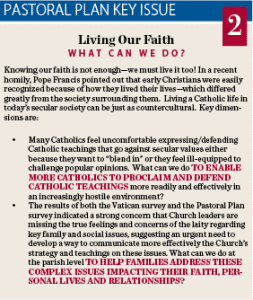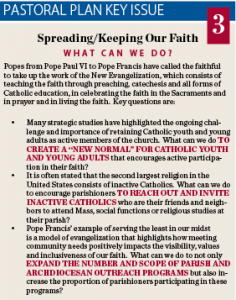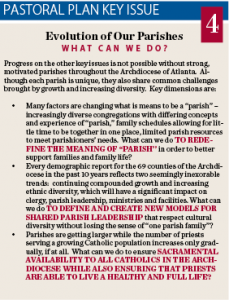Atlanta
Four key issues arise as dynamic pastoral planning process continues
By MARY ANNE CASTRANIO, Staff Writer | Published May 16, 2014
ATLANTA—Issues of faith—knowing it, living it, keeping and spreading it—form the basis of the key concerns, along with a focus on the evolution of parishes, that are emerging in the pastoral planning process.
A survey offered in March as part of the ongoing pastoral planning process yielded these themes of concern about the church from thousands of Catholics and others in north and middle Georgia. In February, Archbishop Wilton D. Gregory invited interested people to participate in this survey and help build a pastoral plan for the next five years. Over 14,000 people responded.
Survey questions were designed to gather a true picture of the needs for the local Church. The views of Catholics—including those who have left the Church and those who are interested in being Catholic—were solicited through the survey in order to identify the needs of the Catholic community.
The results of this pastoral planning survey, combined with local responses to a December 2013 Vatican survey related to the upcoming family synod and interviews with all pastors in late 2012, allowed archdiocesan officials to create a master list, a “Summary of Key Issues,” that presents the major areas for consideration in the pastoral planning process.
The summary begins with an acknowledgement that “any organization can only address a limited number of multi-dimensional issues over a three- to five-year period.” After reviewing all of the information, Archbishop Gregory selected four main issues, with multiple dimensions, that will become the focus of the next steps in the process, as the parishes work to provide recommendations in response.
The summary document, which includes a context, critical dimensions and key questions for each aspect of the issue, was sent to pastors May 12 to share with parishioners. Each parish and mission has been asked to provide three recommendations for the four issues by Aug. 1. The document in its entirety will be posted to the archdiocesan website (www.archatl.com). The method of developing responses has been left to each parish or mission.
‘Knowing our faith’
The first key issue is “knowing our faith.”
 There is a “huge need and hunger for more effective and available catechesis and faith formation to help all ages understand, accept and apply the church’s teachings to their everyday lives,” according to the summary document. In considering this issue parishioners will be asked to discuss three dimensions: parents as primary teachers of the faith, the rise of secularism in the U.S. leading to a lessened focus on religious activities, and support for passing along the values and tenets of the Catholic faith from one generation to the next.
There is a “huge need and hunger for more effective and available catechesis and faith formation to help all ages understand, accept and apply the church’s teachings to their everyday lives,” according to the summary document. In considering this issue parishioners will be asked to discuss three dimensions: parents as primary teachers of the faith, the rise of secularism in the U.S. leading to a lessened focus on religious activities, and support for passing along the values and tenets of the Catholic faith from one generation to the next.
Deacon Dennis J. Dorner Sr., chancellor of the archdiocese and head of the permanent diaconate program, noted the importance of family in learning and sharing the church’s teachings: “The sad reality is that most of our adult Catholic population has been poorly taught. The challenge in them following Jesus’ great commission is that they are ill equipped.”
He believes that “the first and most important place that we can do this is in our families.”
Deacon Dorner added, “It is not just the responsibility of the church to teach about the faith. We have to have a desire to spread it, and that must start at home first and foremost.”
But knowing the faith is just the beginning, “living the faith” is next.
‘Living our faith’
 Many Catholics, according to the summary document, feel “uncomfortable defending Catholic teachings that go against secular values … Strong and deep faith is needed to live a countercultural life as Jesus did in his own time.”
Many Catholics, according to the summary document, feel “uncomfortable defending Catholic teachings that go against secular values … Strong and deep faith is needed to live a countercultural life as Jesus did in his own time.”
Furthermore, the results of both the pastoral planning and Vatican surveys revealed a concern that “church leaders are missing the true feelings and concerns of the laity regarding key family and social issues.” A focus on more effective and timely communication is part of the process.
Deacon Dorner said, “We can spread the faith when we embrace it ourselves. When we, who are already living the faith, show our love for our neighbor and our love and respect for all that Christ taught us in the way that we live our lives, others will be attracted to the faith. The old song says it so well, ‘They will know we are Christians by our love.’”
‘Spreading/keeping the faith’
Key dimensions of this issue involve “the ongoing challenge and importance of retaining Catholic youth and young adults as active members of the church,” as well as the problem of inactive Catholics, “the second largest religion in the United States.”
 Father Tim Hepburn, director of vocations for the Atlanta Archdiocese, believes strongly that the church needs to reach out to those who were once Catholic. He said, “The insistent call of the last three popes has been for a New Evangelization which is, in part, an effort to raise up faith within the already baptized. If we attend to the New Evangelization, the sacraments that we offer will be received with sufficient faith, and they will become fruitful. The fruit will be lay ministry, ordained ministry, renewal and mission.”
Father Tim Hepburn, director of vocations for the Atlanta Archdiocese, believes strongly that the church needs to reach out to those who were once Catholic. He said, “The insistent call of the last three popes has been for a New Evangelization which is, in part, an effort to raise up faith within the already baptized. If we attend to the New Evangelization, the sacraments that we offer will be received with sufficient faith, and they will become fruitful. The fruit will be lay ministry, ordained ministry, renewal and mission.”
He said, “We need to raise up the faith of the baptized until their lives become an encounter with Christ and lead by his Spirit.”
With the example of Pope Francis, “serving the least in our midst” has become the model of evangelization, an essential part of being Catholic.
Miguel R. San Juan, chief executive officer of Catholic Charities Atlanta, said, “Catholic Charities Atlanta, St. Vincent de Paul, and Catholic Relief Services are just some of the Catholic charities that are at the forefront of Pope Francis’ call to serve ‘the least among us.’ I feel that offering parishioners regular opportunities to learn more about these charities and how they can volunteer and support their work is critical to continuing success.”
He hopes that one day more can be done to help those in need: “Maybe one day soon, we could all collaborate in an archdiocesan-wide Catholic Charitable Works Day where there is a coordinated effort across the archdiocese amongst all charities and parishes to serve those in need—some type of one-day awareness and ‘good works day.’”
He added, “Think of what we as Catholics in the archdiocese could do in just one day if we all worked together to help the least in our midst.”
‘Evolution of parishes’
The issues of faith raised in the previous three topics will only progress with “strong, motivated parishes throughout the Archdiocese of Atlanta.” According to the summary document, each unique parish shares with the others “common challenges brought by growth and increasing diversity.”
 This issue involves an understanding of what it means to be a parish, and how the “inexorable trends … of continuing compounded growth and increasing ethnic diversity” will affect the Catholic Church at the parish level. According to the summary document, “these trends have a significant impact on clergy, parish leadership, ministries and facilities.”
This issue involves an understanding of what it means to be a parish, and how the “inexorable trends … of continuing compounded growth and increasing ethnic diversity” will affect the Catholic Church at the parish level. According to the summary document, “these trends have a significant impact on clergy, parish leadership, ministries and facilities.”
In addition, as the parishes continue to grow, the number of priests serving the Catholic population of the archdiocese is “projected to remain flat through 2030.” The church faces the challenge of ensuring “sacramental availability” to all Catholics.
Father Hepburn sees an essential connection between a living, vital faith and the growth of vocations. He said, “Whenever I have seen Catholics wake up in faith, I also see vocational discernment, awareness of spiritual gifts, discipleship, and evangelization. Wherever this is happening, vocations are born, gifts of the Spirit are given and received.”
He said, “In the U.S. there are a few examples of parishes that have taken seriously the New Evangelization and, not surprisingly, those parishes bring forward the most vocations in the diocese. In short, if we focus on mission rather than maintenance I think that the Lord will bless us with all the vocations that we need to do his work.”
What’s next?
All parishes and missions have been asked to participate in creating a purposeful pastoral plan for the archdiocese.
Diane Starkovich, superintendent of Catholic Schools, said, “The emerging themes appear to present some direction to the parishes as each parish now attempts to provide responses and direction to the planning process. Effective strategic planning requires input from a variety of stakeholders, and from these initial responses, I believe the process selected by the archbishop and the planning committee has been validated.”
Pastors have been asked to provide three recommendations on each of the issues by Aug. 1. Study guides will be provided by the archdiocesan Office of Planning and Research, and parishes will meet in some way to gather and articulate their own recommendations. These parish recommendations will be presented to the Convocation of Priests in September and to deanery-level final recommendation meetings in the fall. Winnowed down to the best thinking resulting from all levels in the process, these recommended actions will be sent to the archbishop.
Amy Daniels, head of the archdiocesan Office of Formation and Discipleship, believes that the number of responses to the survey (more than 14,700) shows that “people have concerns” and responded to Archbishop Gregory’s open call for opinions.
She said, “I encourage the people of the archdiocese to take advantage of the pastoral planning process in the weeks and months ahead. A partnership between the laity and the clergy in the pastoral planning process is the best way to effect a positive, pastoral future of the Church in north and central Georgia.”
Gretchen Keiser contributed to this story.